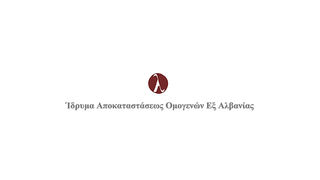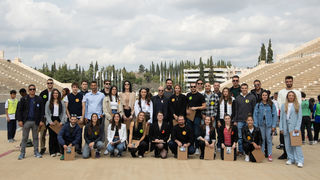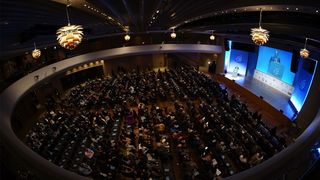Foundation for the Rehabilitation of Albanians of Greek Descent | Two Decades of Support

The last graduation of students of the Vocational Training Centre of the border region of Pogoniani, Ioannina, took place on Friday, 22 June 2012, in an atmosphere of great joy and emotion, thus marking the completion of a historical 20-year cycle, during which the Foundation for the Rehabilitation of Albanians of Greek Descent (IAOA) provided support to the country and demonstrated social solidarity; the IAOA was established in 1991 by John S. Latsis and played a critical role in the technical training, professional development and social integration of persons of Greek descent.
In the presence of members of the Board of Directors of the IAOA, local government representatives, members of the academic community of the University of Ioannina and residents of Pogoniani, diplomas were awarded to 37 graduates of the Vocational Training Centre of the IAOA, which, from 1992 until the end of its operation in 2012, trained a total of approximately 2,280 students that are Albanians of Greek descent, providing them with comprehensive technical knowledge in order to pursue careers as Electricians, Plumbers, Auto Body Technicians, Cooks, Hairdressers, Aluminium Workers, Mechanics, Carpenters etc.
In his speech, Mr Vangelis Chronis, Chairman of the BoD of the IAOA, referred to the rare circumstances under which a situation evolves in such a way as to lead to the completion of the work of a Foundation. Specifically, he stressed that:
“The adverse circumstances faced in 1991, which led John Latsis to decide to establish the Foundation, are now distant memories, as the socioeconomic situation has greatly improved for persons of Greek descent that live or used to live in our neighbouring country. We are satisfied to see that people of Greek descent are making progress, are, to a great extent, integrated in Greek society and have become an integral part of it, are receiving high quality education and often excel even in tertiary education.”
Regarding the work of the Foundation, Mr Chronis said that:
“Our desire was for the Foundation to help the situation at multiple levels; in addition to the rehabilitation of people of Greek descent, our aim was also to build bridges of understanding and friendship between the two countries. It is in this context that the publication of the first Greek-Albanian and Albanian-Greek dictionaries was funded, thus bridging a very big gap that existed up to that point in the relations between the two countries. A cooperation with the University of Ioannina was put into place to award annual prizes, support was provided to the schools of South Albania and to Greek language schools, as well as to many cultural and educational initiatives in the wider region of Epirus.”
The fact that the Foundation has completed its mission and achieved its goal is vividly reflected in the words of Alkis Tallios, a car mechanic who graduated from the Vocational Training Centre in 1995 and now runs his own garage in Livadia, Agii Saranda:
“What can I say? Should I tell you that we learned how to get our act together and become part of another society? Or should I tell you about all the attention we were given and the efforts that were made in order for us to learn? What I can say for sure is that I earn a living thanks to what I learned at the centre. Today, I run my own business and I can compete with big garages.”
At the same event, a total of 12 undergraduate, postgraduate and doctoral students of the University of Ioannina, who are Albanians of Greek descent, were awarded prizes, in the framework of the initiative of the IAOA, which started in the 2006-2007 academic year. Referring to the award of prizes, Mr Georgios Kapsalis, Vice-Chancellor of the University of Ioannina, said that:
“This event is an event to honour, acknowledge and support the efforts made by young people of the University of Ioannina, in order to excel in their scientific field and become a model for others to follow. These young people came to our University after having experienced deprivation and hardship, and they succeeded through hard work in overcoming the difficulties they faced and in creating a bright and promising scientific future for themselves.”
Since the start of the programme, prizes have been awarded to 63 students of Greek descent in total.
BRIEF HISTORY OF THE IAOA
The IAOA started operating in the early 1990s, when, as a response to the difficult socioeconomic situation that followed the opening of the borders, John Latsis decided to donate to the Greek State 5 million dollars in order to provide immediate relief to the population of Greek descent. During the first very difficult years, the Foundation’s humanitarian and developmental action included, among others, the provision of necessities, agricultural equipment and healthcare supplies, the granting of scholarships and aid as well as other actions. Later on, acknowledging the importance of education as the main lever to achieve meaningful and long-term results, the Foundation decided to make education the main focus of its action. Based on this decision, the Training Centre-Boarding School in Pogoniani started operating; in a brief period of time, students acquired essential skills that would allow them to quickly find employment as well as knowledge of the Greek language.


